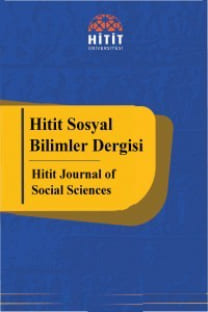NAKİT YÖNETİMİNİ ETKİLEYEN DEĞİŞKENLER ÜZERİNE BIST PERAKENDE SEKTÖRÜNDE PANEL VERİ ANALİZİ
Bu çalışmanın amacı, Borsa İstanbul (BİST) AŞ’de işlem gören ve perakende sektöründe faaliyet gösteren işletmelerin nakit bulundurma politikalarına etkileyen faktörlerin tespit edilmesidir. Çalışma kapsamında Kamuyu Aydınlatma Platformu (www.kap.gov.tr) web sitesinden elde edilen ve 2009-2018 dönemini kapsayan 9 adet perakende ticaret işletmesinin verileri panel veri yöntemi ile analiz edilmiştir. Çalışma sürecinde nakit oranı bağımlı değişken olarak seçilmiş, buna karşılık kaldıraç oranı, varlık yapısı, karlılık, likidite, büyüklük, varlıkların uzun vadeli borçlarla finansmanı, büyüme fırsatları ve nakit temettü dağıtımı bağımsız değişkenler olarak incelenmiştir. Elde edilen sonuçlara göre incelenen dönemde Borsa İstanbul (BİST) AŞ’de işlem gören ve perakende sektöründe faaliyet gösteren işletmelerin nakit bulundurma politikaları üzerinde karlılık, büyüklük, likidite, uzun vadeli borçlanma değişkenlerinin anlamlı bir etkisi olduğu görülmektedir.
Anahtar Kelimeler:
Kârlılık, Perakende Sektörü, BİST, Panel Veri Analizi
___
- KAYNAKÇA Açıkgöz, E., Uygurtürk, H. ve Korkmaz, T. (2015). Analysis of factors affecting growth of pension mutual funds in Turkey. International Journal of Economics and Financial issues, 5(2), 427-433.
- Ali, A. ve Yousaf S. (2013). Determinants of cash holding in German market. IOSR Journal of Business and Management, 12(6), 28-34.
- Baltagi, B. H. (2013). Econometric analysis of panel data, 5th edition. Chichester: John Wiley & Sons.
- Baltagi, B. H. ve Li Qi. (1995). Testing AR(1) against MA(1) disturbances in an error component mode. Journal of Econometrics, 68(1), 133-151.
- Bates, T. W. , Kahle, K. M. ve Stulz, R. (2009). Why do U.S. firms hold so much more cash than they used to ? The Journal of Finance, 64(5), 1985-2021.
- Bigelli, M. ve Vidal, J. S. (2012). Cash holdings in private firms. Journal of Banking & Finance, 36, 26-35.
- Breusch, T. S. ve Pagan, A. R. (1979). A simple test for heteroscedasticity and random coefficient variation. Econometrica, 47(5), 1287-1294.
- Bolak, M. (2000). İşletme finansı. İstanbul: Birsen Yayınevi.
- Brooks, C. (2008). Introductory econometrics for finance, second edition. New York: Cambridge University Press.
- D’Mello, R., Krishnaswami, S. ve Larkin P. (2008). Determinants of corporate cash holdings: Evidence from spin-offs. Journal of Banking & Finance, 32(7), 1209-1220.
- Demir, E. ve Ersan, O. (2017). Economic policy uncertainty and cash holdings: Evidence from BRIC countries. Emerging Markets Review, 33, 189-200.
- Dittmar, A. ve Mahrt-Smith, J. (2007). Corporate governance and the value of cash holdings. Journal of Financial Economics, 83(3), 599-634.
- Ferreira, M. A. ve Vilela, A. S. (2004). Why do Firms hold cash? Evidence from EMU countries. European Financial Management, (10)2, 295-319.
- Gill, A. ve Shah, C. (2012). Determinants of corporate cash holdings: Evidence from Canada. International Journal of Economics and Finance, (4)1, 70-79.
- Gujarati, D. N. (2004). Basic econometrics, 4th Edition. McGraw Hill : New York.
- Hilgen, M. (2015). The determinants of cash holdings: Evidence from German listed firms. MSc Business Administration Financial Management Specialisation, University of Twente.
- KAP (2019). Kamuyu Aydınlatma Platformu Finansal Tablolar, https://www.kap.org.tr/tr/ , Erişim Tarihi: 18.03.2019.
- Kim, J., Kim, H. ve Woods, D. (2011). Determinants of corporate cash holding levels: An empirical examination of the restaurant ındustry. International Journal of Hospitality Management, 30, 568-574.
- Kusnadi, Y. (2011). Do corporate governance mechanisms matter for cash holdings and firm value? Pasific-Basin Finance Journal, 19(5), 554-570.
- Kutlu Furtuna, Ö. (2017). Nakit bulundurma düzeyinin sektörel analizi: Borsa İstanbul’da işlem gören reel sektör firmaları üzerine bir uygulama. Uluslararası Yönetim İktisat ve İşletme Dergisi, 13(3), 615-630.
- Nguyen, P. (2006). How sensitive are Japanese firms to earnings risk? Evidence from cash holdings. School of Banking & Finance, University of New South Wales.
- O’brien, R. M. (2007). A caution regarding rules of thumb for variance inflation factors. Quality & Quantity, 41(5), 673-690.
- Opler, T., Pinkowitz, L., Stulz, R. ve Williamson R. (1999). The Determinants and implications of corporate cash holdings. Journal of Financial Economics, 52(1), 3-46.
- Ozkan, A. ve Ozkan, N. (2004). Corporate cash holdings: An Empirical investigation of UK companies. Journal of Banking & Finance, 28, 2103-2134.
- Saddour, K. (2006), The determinants and the value of cash holdings: Evidence from French firms. Centre de Recherches sur la Gestion Universite Paris Dauphine Cahier de Recherche, No, 2006-6.
- Seifert, B. ve Gönenç, H. (2016). Creditor rights, country governance, and corporate cash holdings”. Journal of International Financial Management Accounting, 27, 65-90.
- Terual, P. J. G. ve Solano, P. M. (2008). On The determinants of SMEs’ cash holding: Evidence from Spain. Journal of Business Finance & Accounting, 35(1-2), 127-149.
- Uyar, A. ve Kuzey, C. (2014). Determinants of corporate cash holdings: Evidence from the emerging market of Turkey. Applied Economics, 46(9), 1035-1048.
- Yerdelen Tatoğlu, F. (2013). Panel veri ekonometrisi: Stata uygulamalı. İstanbul: Beta Yayınları.
- Yayın Aralığı: Yılda 2 Sayı
- Başlangıç: 2008
- Yayıncı: Hitit Üniversitesi
Sayıdaki Diğer Makaleler
KENTSEL SÜRDÜRÜLEBİLİRLİKTE TOPLUMSAL DAYANIŞMA VE BÜTÜNLEŞME KÜLTÜRÜ: İZMİR ÜZERİNE BİR ARAŞTIRMA
Mustafa KÖSEOĞLU, Hüseyin ÜNAL
YÜKSEKÖĞRETİM KURUMLARININ ALGILANAN PAZAR YÖNELİMİ TEMELİNDE DEĞERLENDİRİLMESİ
Ramazan KURTOĞLU, Selman TEMİZ
M. Asıf YOLDAŞ, Mustafa Said AKIN
TARİHSEL SÜREÇLERİN KÜLTÜR VE TURİZM AÇISINDAN DEĞERLENDİRİLMESİ: ERTUĞRUL FIRKATEYNİ
AİLE İŞLETMELERİNDE STRATEJİ BELİRLEME: BİR DURUM ÇALIŞMASI
THE “CRABS IN A BUCKET” MENTALITY IN HEALTHCARE PERSONNEL: A PHENOMENOLOGICAL STUDY
Gizem Zevde AYDIN, Gülpembe OĞUZHAN
ÇOKKÜLTÜRLÜ TOPLUM YAPILARINDA DEĞİŞEN AİDİYET ALGILARI: YENİ TOPLUMLAR, YENİ AİDİYETLER
